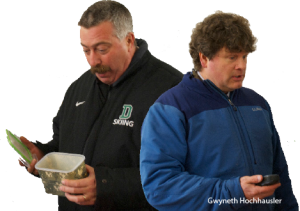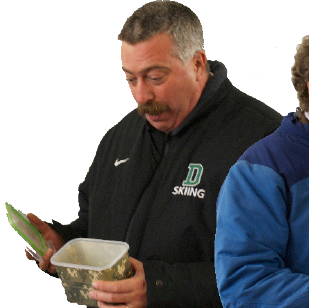It all started with a family hiking trip to Grafton, Vermont, where math teacher Marc Dancer was introduced to the treasure-hunting game geocaching by another family inquiring about his handheld GPS system.
 Immediately intrigued, Mr. Dancer recollected, “When I got back to campus, I looked up what geocaching was and became a member.” He found his first cache soon after in May 2002 and got fellow math teacher Sean Keller on board the following year: they’re now known to the geocaching community under the pseudonyms danceman and mathteacher30 respectively.
Immediately intrigued, Mr. Dancer recollected, “When I got back to campus, I looked up what geocaching was and became a member.” He found his first cache soon after in May 2002 and got fellow math teacher Sean Keller on board the following year: they’re now known to the geocaching community under the pseudonyms danceman and mathteacher30 respectively.
Mr. Dancer offered a brief explanation of his hobby: “When people ask me what geocaching is, I essentially tell them: ‘Somebody has hidden a weatherproof container somewhere around the world, and they have posted the longitude and latitude of where they’ve hidden it. You take that latitude and longitude and put it into your GPS, and off you go to try and find it.’” (Inside the treasure is a logbook to sign when found and various trinkets to trade.)
Mr. Dancer affirmed the difficulty of this activity: “A lot of people might think that with the GPS, all you do is follow the arrow that is going to take you right to it.” However, that is not the case. “The GPS is not that accurate,” he continued, “It takes you to a certain area, then you have to start searching on your own.” Aside from common technological errors, it is up to the individual geocacher to determine the difficulty of his or her next find.
Some caches are hidden in dangerous terrain, while others can be found somewhere as simple as a park. The two math teachers recalled one adventure in Brattleboro, Vermont that included hiking up a mountain, following side-trails and entering a cave via rope, where eventually they stumbled upon not only the treasure, but interesting luminescent moss they had never seen before.
Geocaching is a popular activity worldwide. Mr. Dancer said, “When I travel, whether it’s in the U.S. or abroad, I always look to see what geocaches are there and it’s really a great way to see and learn that area.”
Mr. Keller recollected his own explorations in faraway places: “When I was on the China trip two years ago with faculty, there was a cache a few miles away from our hotel in Beijing, so I got up at six in the morning. I think I walked three miles each way alone in Beijing so that I could find a little Tupperware container.”
The pair’s passion has taken them to various conferences and even competitions, including the recent “Geobash” in July in Pittsfield, Mass. There, they had the opportunity to attend seminars on puzzle-solving and attend workshops to refine their skills and meet fellow geocashers.
Mr. Keller and Mr. Dancer have several caches hidden along the Pocumtuck Ridge and invite students to partake in this hobby.
Zeke Emerson ’16 took up the challenge, saying, “Although I only started geocaching this fall, I feel totally hooked. I was initially drawn to the puzzle and riddle aspect of geocaching, but am still nowhere close to good enough for those! To my surprise, just finding the cache alone poses an incredible challenge, even when your GPS can lead you to the right coordinates.”
Mr. Keller indicated that starting is easier than one may think, “Whenever I’ve talked to students about this over the years, generally their initial response is: ‘People don’t do this where I’m from,’ or ‘I know they don’t have these caches around where I live.’ So I’ve often sat down with a student, gone onto the geocaching website, found their area and there’s usually dozens within a mile or two from their house. I think this activity is much more widely spread than people realize, and if they want to get involved with it and have fun with it, they can probably do it within walking distance from their home.”
Zeke Emerson echoed Mr. Keller’s sentiments, recalling, “My favorite experience was my first night cache, and the only one so far. My friends and I went out late to get food, and before long we were searching the depths of Greenfield for caches. Rather scary, but all the more memorable!”
All it takes is a GPS, or the app on your cell phone, to begin.

